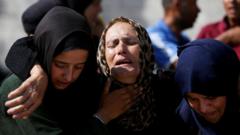Hamas has reportedly indicated readiness to enter negotiations regarding a new ceasefire and hostage release plan suggested by U.S. mediators, as the conflict continues to escalate with ongoing Israeli airstrikes.
Hamas Indicates Willingness to Negotiate Gaza Ceasefire Terms

Hamas Indicates Willingness to Negotiate Gaza Ceasefire Terms
In a recent statement, Hamas has expressed a "positive response" towards a ceasefire proposal, signaling a potential shift in the ongoing Israel-Gaza conflict.
In the midst of intense violence and rising casualties, Hamas claims it has delivered a constructive response to a ceasefire proposal from U.S. intermediaries, with discussions about resuming food and medical aid for Palestinians as a priority.
Hamas has stated it is "seriously ready to enter immediately into a round of negotiations" over the latest ceasefire plan, although no formal acceptance has been made. Former President Donald Trump remarked that a response from Hamas was anticipated within a day. Reports suggest that Israel has agreed to the necessary conditions for a 60-day ceasefire period, which would focus on the staggered release of Israeli hostages in return for Palestinian prisoners.
Hamas’s demands appear to hinge on several key elements, including the resumption of unrestricted humanitarian aid to Gaza and assurances that Israeli military operations will cease following the 60-day temporary ceasefire. As part of the discussions, negotiations on a longer-term resolution to the conflict and the remaining hostages would commence on day one.
Despite these negotiations, violent skirmishes continue, with the Israeli military carrying out attacks that reportedly killed at least 138 individuals in Gaza over a 24-hour span. As families mourn the losses of their loved ones, public sentiment is increasingly charged, with calls for a cessation of violence growing louder.
The Red Cross has also reported incidents of injury amongst its staff in Gaza, highlighting the precarious situation for both residents and aid workers as hostilities persist. Medical organizations are raising alarms about the humanitarian crisis in Gaza, describing a situation marked by systemic starvation that has been exacerbated by the ongoing conflict.
In Israel, families of the remaining hostages are urging the government to prioritize their release and reinforce the need for a comprehensive peace agreement. Israeli Prime Minister Benjamin Netanyahu, while visiting communities affected by the conflict, reaffirmed his commitment to ensuring the return of all hostages, yet he has made clear that military operations against Hamas will continue until they are eliminated as a threat.
As the deadline for a potential ceasefire approaches, both sides remain on edge amidst the uncertainty of future talks, creating a complex landscape for the ongoing efforts at peace in a region marked by decades of conflict.
Hamas has stated it is "seriously ready to enter immediately into a round of negotiations" over the latest ceasefire plan, although no formal acceptance has been made. Former President Donald Trump remarked that a response from Hamas was anticipated within a day. Reports suggest that Israel has agreed to the necessary conditions for a 60-day ceasefire period, which would focus on the staggered release of Israeli hostages in return for Palestinian prisoners.
Hamas’s demands appear to hinge on several key elements, including the resumption of unrestricted humanitarian aid to Gaza and assurances that Israeli military operations will cease following the 60-day temporary ceasefire. As part of the discussions, negotiations on a longer-term resolution to the conflict and the remaining hostages would commence on day one.
Despite these negotiations, violent skirmishes continue, with the Israeli military carrying out attacks that reportedly killed at least 138 individuals in Gaza over a 24-hour span. As families mourn the losses of their loved ones, public sentiment is increasingly charged, with calls for a cessation of violence growing louder.
The Red Cross has also reported incidents of injury amongst its staff in Gaza, highlighting the precarious situation for both residents and aid workers as hostilities persist. Medical organizations are raising alarms about the humanitarian crisis in Gaza, describing a situation marked by systemic starvation that has been exacerbated by the ongoing conflict.
In Israel, families of the remaining hostages are urging the government to prioritize their release and reinforce the need for a comprehensive peace agreement. Israeli Prime Minister Benjamin Netanyahu, while visiting communities affected by the conflict, reaffirmed his commitment to ensuring the return of all hostages, yet he has made clear that military operations against Hamas will continue until they are eliminated as a threat.
As the deadline for a potential ceasefire approaches, both sides remain on edge amidst the uncertainty of future talks, creating a complex landscape for the ongoing efforts at peace in a region marked by decades of conflict.




















